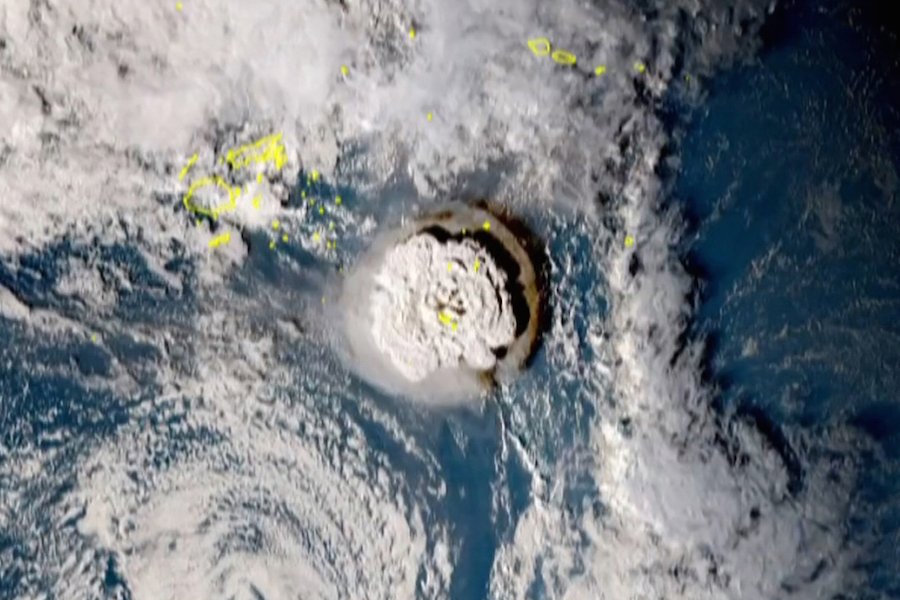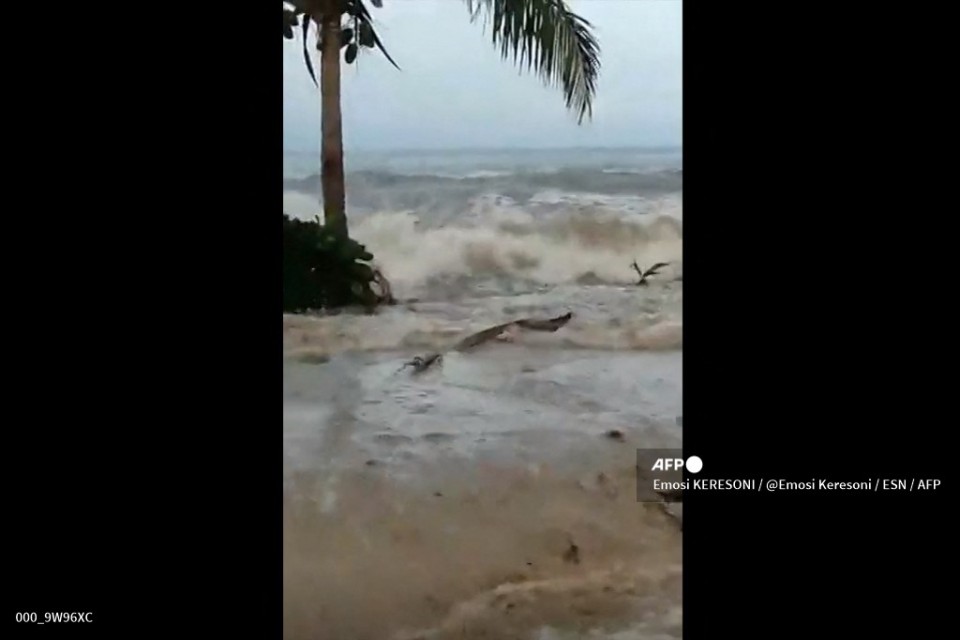
A massive volcanic eruption in Tonga that triggered tsunami waves around the Pacific caused “significant damage” to the island nation’s capital and smothered it in dust, New Zealand Prime Minister Jacinda Ardern said Sunday.
The eruption Saturday was so powerful it was recorded around the world, triggering a tsunami that flooded Pacific coastlines from Japan to the United States.
The capital Nuku’alofa suffered “significant” damage, Ardern said, adding there had been no reports of injury of death but a full assessment was not yet possible with communication lines down.
“The tsunami has had a significant impact on the foreshore on the northern side of Nuku’alofa with boats and large boulders washed ashore,” Ardern said after contact with the New Zealand embassy in Tonga.
“Nuku’alofa is covered in a thick film of volcanic dust but otherwise conditions are calm and stable.”
However, there has been no word on damage in the outer islands and New Zealand will send an air force reconnaissance aircraft “as soon as atmospheric conditions allow,” the NZ Defence Force tweeted.
“We’re working hard to see how we can assist our Pacific neighbours after the volcanic eruption near Tonga.”
The United States was “deeply concerned for the people of Tonga,” Secretary of State Antony Blinken said, pledging support for the island nation.
A 1.2 metre wave swept ashore in the Tongan capital with locals reporting they had fled to higher ground, leaving behind flooded houses, some with structural damage, and with small stones and ash falling from the sky.
“It was massive, the ground shook, our house was shaking. It came in waves. My younger brother thought bombs were exploding nearby,” resident Mere Taufa told the Stuff news website Saturday.
She said water filled their home minutes later and she saw the wall of a neighbouring house collapse.

– ‘People screaming’ –
“We just knew straight away it was a tsunami. Just water gushing into our home.
“You could just hear screams everywhere, people screaming for safety, for everyone to get to higher ground.”
Tonga’s King Tupou VI was reported to have been evacuated from the Royal Palace in Nuku’alofa and taken by police convoy to a villa well away from the coastline.
Dramatic satellite images showed the long, rumbling eruption of the Hunga Tonga-Hunga Ha’apai volcano spew smoke and ash in the air, with a thunderous roar heard 10,000 kilometres (6,000 miles) away in Alaska.
The eruption triggered tsunamis across the Pacific with waves of 1.74 metres (five and a half feet) measured in Chanaral, Chile, more than 10,000 kilometres away, and smaller waves seen along the Pacific coast from Alaska to Mexico.
Waves of around 1.2 metres (four feet) hit along Japan’s Pacific coast.
By 0300 GMT Sunday, the Pacific Tsunami Warning Center in Hawaii said the threat from the eruption had passed.
– Heard in Alaska –
The US Geological Survey recorded Saturday’s eruption as equivalent to a 5.8-magnitude earthquake at zero depth.
The volcano’s eruption lasted at least eight minutes and sent plumes of gas, ash and smoke several kilometres into the air.
New Zealand scientist Marco Brenna, a senior lecturer at Otago University’s School of Geology, described the impact of the eruption as “relatively mild” but said another eruption with a much bigger impact could not be ruled out.
The eruption was so powerful it was even heard in Alaska, the UAF Geophysical Institute tweeted.
“A part of the pressure signal in Alaska was in the audible range. The very large signal is not that surprising considering the scale of the eruption, but the audible aspect is fairly unique,” it said, citing Alaska Volcano Observatory scientist David Fee.
“He recalls only a couple other volcanic eruptions doing something like this: Krakatau and Novarupta,” it tweeted. This referred to the 19th century eruptions of Indonesia’s Krakatau and Alaska’s Novarupta, the most powerful volcanic eruption of the 20th century.
The Fife weather station in Scotland tweeted it was “just incredible to think of the power that can send a shockwave around the world” after the eruptions produced a jump in its air pressure graph.
Hunga-Tonga-Hunga-Ha’apai, which lies about 65 kilometres north of Nuku’alofa, has a history of volatility.
In recent years, it breached sea level during a 2009 eruption while in 2015 it spewed so many large rocks and ash into the air that when they settled a new island had formed two kilometres long by one kilometre wide and 100 metres high.
cf/arb/mtp/kma
© Agence France-Presse







